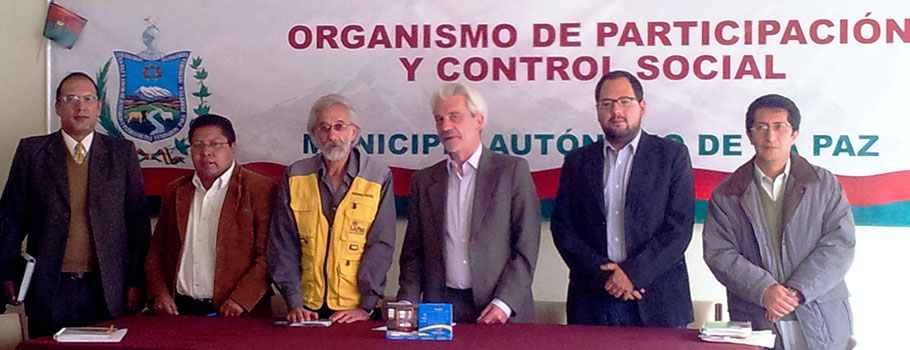
Thanks to our cooperation partners – both in Bolivia and in Europe –, we are constantly improving the projects of Fundación Pueblo and we can also expand them. The diversity of the partners reflects the secular and political independence of the foundation. The constant exchange between Bolivia and Europe repeatedly requires and promotes a critical self-reflection and unconventional initiatives. Long-term partnerships are a special witness to the concrete solidarity of the work, and furthermore build mutual trust and help maintain the sustainability of our projects.
A list of our partners at this point is unavoidably incomplete, but below is an example of the spectrum of national and international solidarity benefiting the target groups of the Fundación Pueblo.
Unifying solidarity
 The support circle “Friends of Bolivia” with its headquarters in the Bavarian town Kelheim, has grown out of an initiative by socially and environmentally committed mountain lovers. In the 90s, with the help of Fundación Pueblo, a small reforestation project in a remote community in the Yungas was laid out. From impressive on-site experience emerged a charitable organisation which informed about the work of the Foundation Pueblo to the German speaking world and encouraged donations for our projects in Bolivia. The voluntary and tireless work of club members has become crucial for the long-term support of the Fundación Pueblo. Members and friends visit about every two years under their own means, to make a first hand report of the progress in the projects and to interact on the spot with the immediate project participants.
The support circle “Friends of Bolivia” with its headquarters in the Bavarian town Kelheim, has grown out of an initiative by socially and environmentally committed mountain lovers. In the 90s, with the help of Fundación Pueblo, a small reforestation project in a remote community in the Yungas was laid out. From impressive on-site experience emerged a charitable organisation which informed about the work of the Foundation Pueblo to the German speaking world and encouraged donations for our projects in Bolivia. The voluntary and tireless work of club members has become crucial for the long-term support of the Fundación Pueblo. Members and friends visit about every two years under their own means, to make a first hand report of the progress in the projects and to interact on the spot with the immediate project participants.
The solidarity of friends in the Rhenish Palatinate, who are especially committed to the “House of the Future” in El Alto and its projects, has concentrated around the church district Neustadt on Weinstrasse, they build among others on the partnership fund “Bread for the World”. The action group ‘We are helping One World’ of St Vincent’s community in Erding near Munich, has for years also strongly supported the project of the ‘House of the Future’.
The Schmitz Foundations in Dusseldorf are an important partner in the spreading of the “student board in host families” project in Bolivia and support Fundación Pueblo in building this sustainable social service in Tarija.
The initiative ‘Brother and Sister in Need’ of the catholic church in Kärnten is is at our side when it comes to the support of further community development projects based on the ‘student board in host families’ model . They also supported the project with Fundación Pueblo in north Potosí to expand the supply of healthy local foods and to encourage its growth.
From Göttingen the self-taxation initiative ‘Towards One World” stretches a bridge of solidarity to distant Yanacachi, where it supports the commitment of Fundación Pueblo to civics.
Other initiatives in schools, clubs, One World Shops and One World groups in Germany, Austria and Switzerland support the Fundación Pueblo as well as some private donors, who donate mainly through the society of “Friends of Bolivia”.
The German Embassy in La Paz has already on several occasions entrusted to the Fundación Pueblo resources for specific measures from their micro-projects fund for poverty reduction and with all cases are reassured that proper and sensible use of their resources is made locally.
The Christian Peace Service EIRENE has joined us for several years of office community cooperation, we can share not only the cost of a house in La Paz, but also the daily joys and concerns of the commitment to the most disadvantaged groups in Bolivia.
The road to sustainability in Bolivia
In Bolivia, Fundación Pueblo was able to win the support of rural districts as a mainstay of the sustainability of the access to school program. Since these authorities have their own, not inconsiderable budget and can decide relatively independently about its use, we create new “student accommodation in host families” programs with a minimum three-year cooperation agreement that stipulates that the participating districts commit to a gradual takeover of the operating costs. This sustainability model has enabled the survival of many of these new social services in the communities even after the end of the financial support provided by Fundación Pueblo.
Practical solidarity and cooperation in Bolivia is also reflected in the agreements and joint actions that connect us with various civil society and public institutions. This includes our long-term cooperation agreement with the State radio station “Radio Yungas” and the volunteer work of professionals in adult education measures within the framework of our programs to promote women and civics. Here the spectrum of friendly non-governmental institutions and the Office of the Ombudsman of Bolivia extends to ministries of the national government.
Bridges to neighbouring countries
At the regional level, we are pleased to continue to build on the technical support of The Economic Commission for Latin America (ECLA), when it comes to the spread of the social innovation of ‘school board in a host family’ within and also beyond the borders of Bolivia. The ECLAC has repeatedly enabled lecture tours of our employees in various countries in Latin America in order to introduce the program to interested organizations.
Networks for learning and sharing
Membership and participation in networks helps the Fundación Pueblo to pursue common interests with others in order to better learn from others’ experiences and to pass on their own:

The Fundación Pueblo is a member of the network OVAL, in which German Organisations in Bolivia come together to share experiences and promote the common interest of non-governmental institutions.
 As an institution where voluntary solidarity work plays an important role, we are members of the “Red de Organizaciones para el Voluntariado” and the volunteer network ASOVOL (Articuladora Social Organizaciones de Voluntariado).
As an institution where voluntary solidarity work plays an important role, we are members of the “Red de Organizaciones para el Voluntariado” and the volunteer network ASOVOL (Articuladora Social Organizaciones de Voluntariado).
![]() Through our participation in the ‘Pact for the common good’ (“Pacto poor el Bien Común”),which goes back to a nationwide initiative of the Jubilee Foundation, which is committed to a fair and transparent distribution of public resources among the autonomous authorities in Bolivia, we can contribute our experience in promoting access to important civic information for the target groups of our program in order to promote democracy.
Through our participation in the ‘Pact for the common good’ (“Pacto poor el Bien Común”),which goes back to a nationwide initiative of the Jubilee Foundation, which is committed to a fair and transparent distribution of public resources among the autonomous authorities in Bolivia, we can contribute our experience in promoting access to important civic information for the target groups of our program in order to promote democracy.
 As a member of the UNESCO network “INNOVEMOS – Red Regional de Innovaciones Educativas Para América Latina y el Caribe” (Education Innovations Network for Latin America and the Caribbean) we make our innovations in education available to interested organisations in Latin America.
As a member of the UNESCO network “INNOVEMOS – Red Regional de Innovaciones Educativas Para América Latina y el Caribe” (Education Innovations Network for Latin America and the Caribbean) we make our innovations in education available to interested organisations in Latin America.



